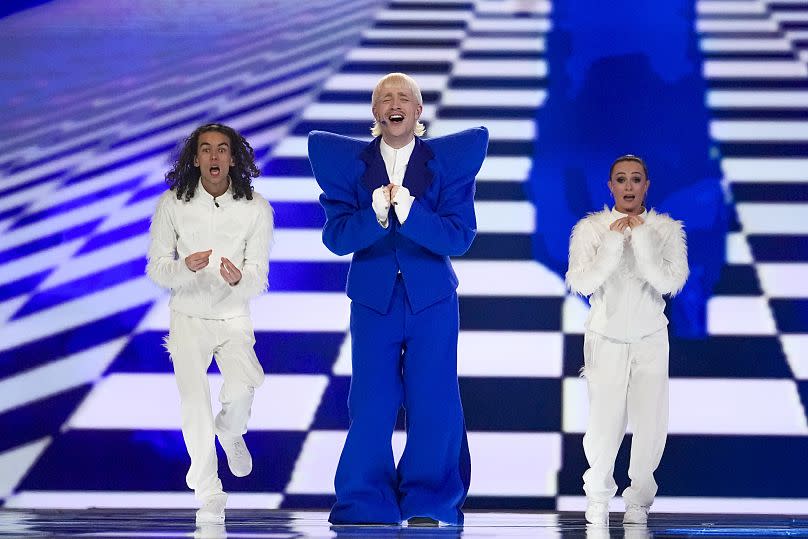Switzerland may have won Eurovision, but do streaming figures paint a different picture?

- Oops!Something went wrong.Please try again later.
- Oops!Something went wrong.Please try again later.
Switzerland may have triumphed at this weekend’s Eurovision Song Contest, but newly released streaming data paints a different picture of who the public are actually listening to.
On Saturday, Switzerland’s Nemo won the 2024 Eurovision Song Contest when their song ‘The Code’ received the top vote from the jury and the fifth most votes from the public. Nemo made history as the first non-binary artist to win the contest, and brought the trophy back to Switzerland for the first time since 1988.
Pro-Palestinian protesters march against Israel's participation in Eurovision
Disqualified Eurovision contestant Joost Klein likely to face charges, Swedish police say
Leading up to the event, Nemo was one of the favourites often placing just behind Croatia’s Baby Lasagna as the odd-on favourite to win. Newly released data from Spotify shows that Nemo was the second-most streamed artist in the week build-up to the event.
The most streamed artist’s song in the week before the Eurovision final wasn’t even one that made it on stage. Dutch entry Joost Klein’s song ‘Europapa’ was also one of this year’s favourites and in the week before the final, it was the most-streamed song of this year’s competition on Spotify.
Popularity amid controversy
Klein has been the subject of massive media interest after his sudden disqualification from the contest on the day of the final. Rumours had circulated that his disqualification was related to Klein openly antagonising the controversial Israeli entry in a press conference earlier.
However, the European Broadcasting Union (EBU) has said it was the result of an “incident” between Klein and a camera operator. Yesterday, Swedish police confirmed they are looking into the incident and Klein is likely to be charged.

Unsurprisingly, in the data for Spotify streams the day after the final shows that winner Nemo had the most streamed song of all the competitors. Despite not participating in the actual televised final, Klein has clearly held the public’s interest – either due to the controversy or in spite of it – with his song ‘Europapa’ the second-most streamed on the day after the contest.
In both the lists for the week before and the day after, Croatian entry Baby Lasagna’s song ‘Rim Tim Tagi Dim’ was the third-most streamed song. It’s no surprise given Baby Lasagna was the overall favourite to win going into the final and finished in second place with the largest points haul from the televote and the third-most from the jury.
Controversy amid unpopularity
Israel’s presence has made this year one of the most controversial in recent years. After Russia was excluded from the contest in 2022 for its invasion of Ukraine, many Eurovision fans felt Israel should have been similarly excluded for its violent military campaign in Gaza following the Hamas attacks on 7 October 2023.
Over 12,000 people congregated in Malmö to protest the inclusion of the country’s entry, the Russian-Israeli singer Eden Golan who the EBU forced to rewrite her song ‘October Rain’ as ‘Hurricane’ to remove political messaging around the Israel-Hamas war.
Despite the protests from inside and outside of the competition, Israel received a huge amount of the televote, taking the second most votes and the most 12 points. Due to a low jury vote, Israel came in fifth place overall.
The large televote though hasn’t translated to Golan’s song being one of the most-streamed of the high scorers. In the week before the ceremony, ‘Hurricane’ was just the 10th most-streamed song, rising only to eighth place the day after the final.
Such a big disparity between the public vote and Spotify streams suggest two things. The first might be that the song was popular with an older generation of voters that are less likely to use streaming platforms. Alternatively, it could be a sign that Israel’s popularity this year was the result of political voting and not representative of actual interest in the music.
Bambie Thug-hive rise!
On the other end of the spectrum, one artist has shown a massive increase in public interest in the weeks surrounding the contest. Ireland’s Bambie Thug stunned audiences with their “ouija-pop” performance of ‘Doomsday Blue’ which included everything from witchcraft, runestones and flames.
Bambie Thug has also been one of the biggest critics of Israel’s inclusion in this year’s competition. While Ireland placed in sixth overall, one spot behind Israel, ‘Doomsday Blue’ has been hailed the “unofficial Eurovision fan favourite” by Spotify as it received a 950% increase in streams in the week leading up to the final.

Over on TikTok, similar data shows the increase in interest in each nations’ entries since the final aired. Once again, Switzerland’s Nemo has received the biggest increase in TikTok attention since the final with 3,245% more users creating videos with their song ‘The Code’ since.
There’s a big drop-off to the next biggest increase with Croatia’s Baby Lasagna seeing a 372% increase in content for his song ‘Rim Tim Tagi Dim’. Much like on Spotify though, Bambie Thug shows their potential longevity with the fifth biggest increase (66%) in creations since the final.

